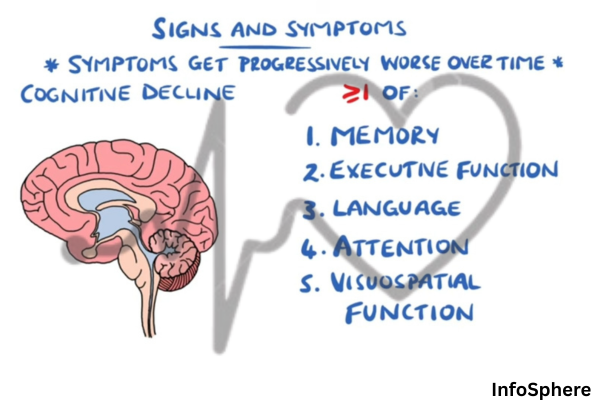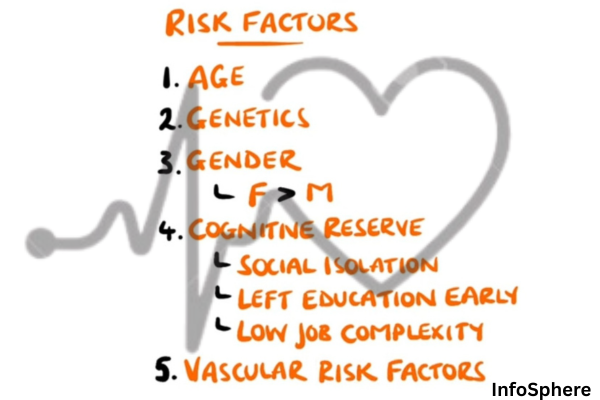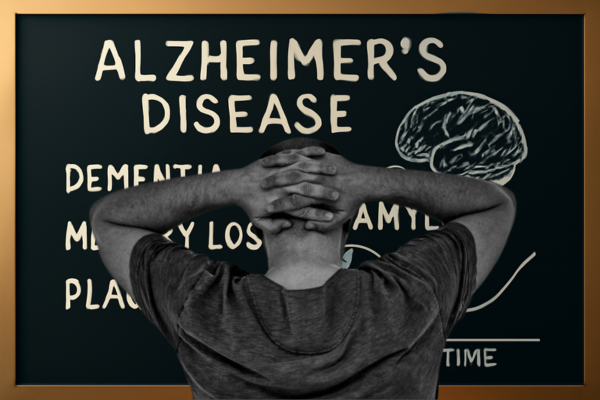
What is Alzheimer’s disease?
How will you feel when you wake up in the morning and are unable to recognize the things and people around you, and then after some time you remember everything, and this keeps happening to you often? Yes, something like this is felt in Alzheimer’s. Dr. Alois Alzheimer first discovered Alzheimer’s disease in 1906-1907, and the disease was named after him. Approximately 55 million people are affected by Alzheimer’s disease every year.
Table of Contents
Causes and Risk Factors
It is unfortunate that even in this age of science we have not been able to know the real cause of Alzheimer’s disease, but some studies show that the disease is caused by the collection of amyloid plaques and proteins called tau tangles in the brain. These proteins prevent the brain from performing its functions and sometimes even kill brain cells. Alzheimer’s disease is a very common cause of dementia. Dementia is a stage when our brain starts facing various kinds of problems, like memory loss, difficulty in thinking, difficulty in doing basic daily tasks, etc.
Symptoms
The symptoms of Alzheimer’s disease appear very slowly; it is not a process of a few weeks or months, it takes years. In the beginning we didn’t even notice these symptoms. Many times we associate them with some other disease. The symptoms of this disease depend on the stage of the disease. It mainly has 3 stages.
| Early Stage | Misplacing dailey use items, forgetting recent events like did I eat food or not?, Getting lost in familiar places like home. |
| Middle stage | Misplacing dailey use items, forgetting recent events like, did I eat food or not?, Getting lost in familiar places like home. |
| Late-Stage | Misplacing items more frequently, forgetting recent events, difficulty solving problems like opening water bollte, getting lost in familiar places like home and the garden. |
Tip: Anyone with Alzheimer’s disease whose symptoms are rapidly getting worse should be seen by a doctor so these can be managed. Early management can slow down complications.

Causes and Risk Factors:-
We have not been able to know the real cause of Alzheimer’s disease, but there are several risk factors, like age, genetics, lifestyle, and injury. Unfortunately these risk factors are common in many diseases.
Age: Age is such a factor that we cannot do anything about it. It is not possible to stop it from increasing, nor can we take any measures for it. Most cases of Alzheimer’s disease are seen in people over 65 years of age. That is why age is a major factor. As age increases, diseases start appearing in our body; Alzheimer’s is also one of them.
Genetic: Family history and genes like APOE-e4 may increase the risk. These factors are non-modifiable risk factors.
Lifestyle: People who smoke, drink alcohol, and consume other intoxicants are at a higher risk. If you remain ignorant, you are at a higher risk of getting all the diseases.
Injury: A history of severe head trauma may elevate the risk.

How is Alzheimer’s diagnosed?
The diagnosis of Alzheimer’s disease involves various tests and physical examinations. Therefore, after talking to the patient and their family members, we get an idea, but medical tests are also necessary to confirm the diagnosis. Hence, we cannot link Alzheimer’s to any other disease.
• Cognitive and Memory Tests: Assessments to evaluate thinking skills and memory.
• Imaging Tests: MRI and CT scans to detect brain changes. Click here to understand MRI and CT in detail.
• Mental ability tests: These tests assess a number of different mental abilities, including:
- long-term and short-term memory.
- concentration and attention timing.
- language and communication skills.
- awareness of time and place (orientation).
- abilities related to vision (visuospatial abilities).
💡💡💡 It’s important to remember that test scores may be influenced by a person’s level of education. For example, someone who is illiterate and cannot read or write may have a lower score, but there is a very high chance they may not have Alzheimer’s disease.
Treatment Options
The sad truth is that we still do not know the cause of Alzheimer’s disease, nor is there any permanent cure available for it. But there are some medications available that can temporarily reduce symptoms.
Medications
- Donepezil, galantamine, and rivastigmine can be prescribed by the doctor for people with early- to mid-stage Alzheimer’s disease.
- Memantine is used for moderate or severe Alzheimer’s disease. It’s suitable for those who cannot take or are unable to tolerate AChE inhibitors.
- Risperidone or haloperidol. These are the only medicines till now licensed for people with moderate to severe Alzheimer’s disease, where there’s a risk of harm to themselves or others.
- Antidepressants may sometimes be given if depression is suspected as an underlying cause of anxiety.
Lifestyle Adjustments:
- Physical activity: daily walk with a parent.
- Mental exercises—Play games like chess or cards, or read books.
- A healthy diet may slow progression.
Supportive Care
- Establishing routines
- Simplifying tasks
- Creating a safe environment is essential for those with advanced stages of Alzheimer’s.

Can Alzheimer’s Be Prevented?
It is unfortunate that even in this age of science we have not been able to know the real cause of Alzheimer’s disease. Nor has any study come out so far that can suggest a permanent cure for it. We can only take some precautionary measures, which will reduce the chances of getting this disease. There are some lifestyle habits by adopting which we can reduce the risk of Alzheimer’s disease, like regular exercise, a balanced diet, and mental activities such as reading and puzzles.
What is the main cause of Alzheimer’s?
Unfortunately, the exact and real cause of Alzheimer’s disease is not clear yet. But some studies show that the disease is caused by the collection of amyloid plaques and proteins called tau tangles in the brain.
What are the signs of Alzheimer’s?
There are several signs of Alzheimer’s, like Misplacing items, forgetting recent events like Did I eat or not?, difficulty solving problems, and getting lost in familiar places are the early signs of Alzheimer’s disease.
How to avoid Alzheimer’s?
Unfortunately, as we know, the exact and real cause of Alzheimer’s disease is not clear yet; till now, no such research has come to light that can tell us the solution to prevent Alzheimer’s disease.
What daily routines work best for Alzheimer’s patients at home?
Walking in premices with an attendant. Forward and backward movement holding some support, 2–3 times daily. Plenty water drinking preferably Luke warm water 3–4 litre daily. Balanced Diet 1800 calories. Sleep for 7–8 hours.
Can a physical exam detect Alzheimer’s ?
To a large extent it is but to confirm it we need the help of medical tests like MRI.
Can the physical examination of a patient with Alzheimer’s be wrong?
Yes, It’s important to remember that test scores may be influenced by a person’s level of education. For example, someone who is illiterate and cannot read or write may have a lower score, but there is a very high chance they may not have Alzheimer’s disease.

Recent Research on Alzheimer’s Disease (2025) — With References
In this modern era a lot of research is going on on Alzihmers. Here’s a summary of the most important recent research updates on Alzheimer’s disease.
1. New Disease-Modifying Drugs: Donanemab, Lecanemab, and Trontinemab
- Donanemab and Lecanemab are monoclonal antibodies that target amyloid plaques (proteins that build up in the brain). They can slow cognitive decline by around 30% if started early, though results vary based on disease stage and patient selection.weforum+1
- Trontinemab is a new investigational antibody shown in clinical trials to rapidly and robustly clear amyloid plaques in the brain—the latest phase saw 91% of participants cleared below the positivity threshold within 28 weeks. Larger Phase III trials are starting in both early stage and preclinical Alzheimer’s disease to see if progression can be prevented or delayed.roche
2. Blood Test for Early Diagnosis
- The US FDA approved a blood test that detects amyloid plaques, allowing earlier and much more accessible diagnosis compared to expensive PET scans or lumbar punctures.This reduces the cost of diagnosis by 50%. The test correctly identifies amyloid in over 91% of cases.weforum
3. Breakthroughs in Genetic, Inflammatory, and Cellular Pathways
- MIT researchers have found new genetic and cellular targets, including DNA repair processes that were not known before, which may play a role in the development of Alzheimer’s disease. This discovery could lead to future treatments that work on several disease causes at the same time, not just on amyloid or tau proteins.news.mit
- Researchers at Yale School of Medicine have discovered that small swellings in nerve fibers, called axonal spheroids, play an important role in Alzheimer’s disease. They have also done research on some medicines which reduce this inflammation and improve the brain function. This opens up a new treatment approach beyond the usual focus on amyloid and tau proteins.medicine.yale
4. Diabetes Drug Showing Protective Effects
- Semaglutide (Ozempic) is a diabetes medicine that is useful in reducing weight. Many US studies have shown that its use reduces the risk of developing Alzheimer’s in diabetes patients by 70%. This protective effect was slightly stronger in women and is being tested in clinical trials for direct use in Alzheimer’s disease.nature
5. Personalized and Multimodal Approaches
- The latest research highlights we are trying to combine lifestyle modifications, cognitive training, and caregiver support with drug therapies for best results—especially as early diagnosis becomes easier with new biomarkers and blood tests.nature+2
6. More Than 120 Drug Candidates in Trials
- Currently, research is going on on about 120 medicines covering amyloid, tau, inflammation, and other novel targets, which is likely to bring good news for the treatment of Alzheimer’s in the near future. Though access and cost remain concerns.weforum
Disclaimer
The information provided in this article on Alzheimer’s disease is for educational and informational purposes only. It should not be considered a substitute for professional medical advice, diagnosis, or treatment. Always seek the advice of your physician or a qualified healthcare provider with any questions you may have regarding a medical condition.
- Neonatal Disorders: Silent Killers Every Parent Must Know About - September 8, 2025
- COPD Life Expectancy by Stage: What to Expect and How to Improve Your Future. - September 5, 2025
- Chronic Obstructive Pulmonary Disease (COPD): 3.5 million deaths in 2021. - September 3, 2025


2 thoughts on “Alzheimer’s Disease: Shocking truth about memory loss.”